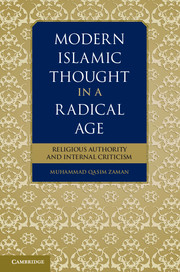3 - The Language of Ijtihad
Published online by Cambridge University Press: 05 November 2012
Summary
Few terms have been invoked more often in modern intra-Muslim debates than ijtihad. Modernist intellectuals have frequently invited their coreligionists to rethink their dogmatic certainties in terms of ijtihad; and the Muslim governing elite have no less frequently justified their legislative and judicial measures as forms of ijtihad. Since the late nineteenth century, as observed earlier, many Muslims have come to explicitly reject the authority of the medieval schools of law in favor of unmediated recourse to the Islamic foundational texts – the Qur'an and the teachings of the Prophet Muhammad – as well as the practice of the earliest generations of Muslim forbears (the salaf). Ijtihad has had an important place in this reconfigured terrain. Many Sunni Islamists have a more ambivalent attitude toward ijtihad, although appeals to it continue to form part of their critique of the `ulama as well.
Against the overlapping challenges of the Salafis and the Islamists, modernist Muslims and modernizing governments, many among the Sunni `ulama of modern times, especially in South Asia, have often expressed grave misgivings about ijtihad. Their discomfort has rested, inter alia, on the conviction that the scholarly tradition is not only a repertoire of authoritative norms but also of agreed-upon methods for interpreting the foundational texts. Any willingness to set aside these time-honored methods immediately raises the specter of willfully subordinating God's word to ill-informed guesswork, which serves only to pave the way toward interpretive anarchy. Yet, caricatures apart, many among the `ulama, too, have come to adopt the language of ijtihad – that is, to affirm that it is not just possible but often necessary to undertake ijtihad in meeting particular challenges.
- Type
- Chapter
- Information
- Modern Islamic Thought in a Radical AgeReligious Authority and Internal Criticism, pp. 75 - 107Publisher: Cambridge University PressPrint publication year: 2012



